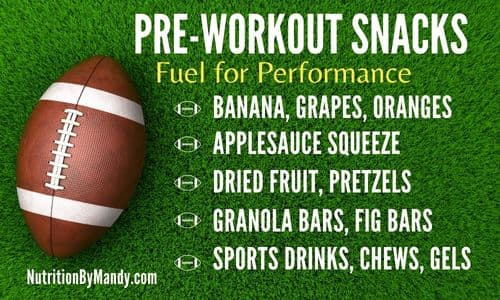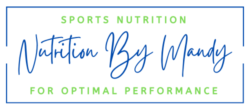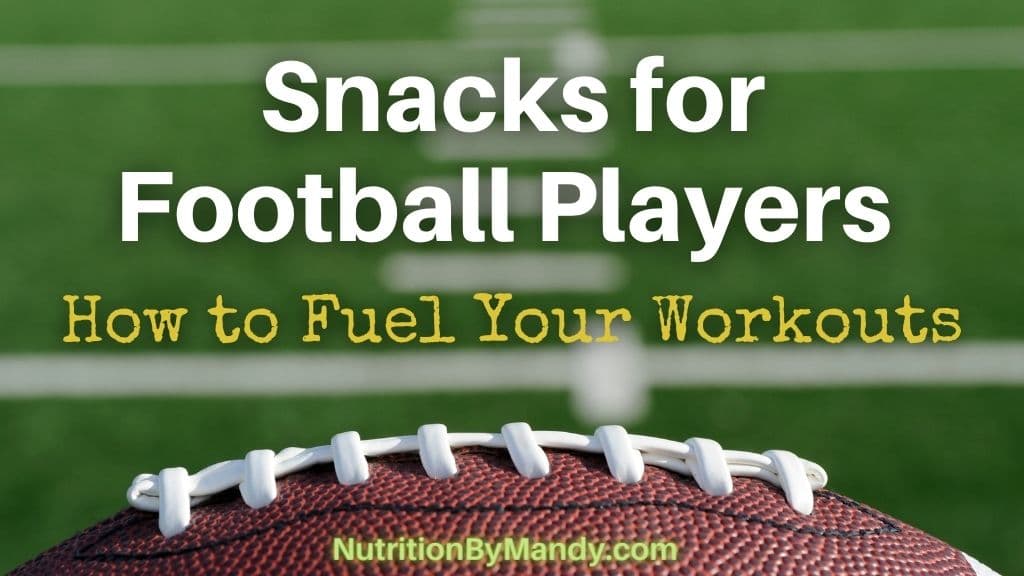Snacks for Football Players – How to Fuel Your Performance
It is August in Texas, which means one thing – the start of football season. With practices underway, planning healthy snacks for football players is important.
Below are easy snack ideas that football players can use to stay fueled before, during, and after activity.
Planning Nutritious Snacks for Football Players
Having the right food available at the right time is key for promoting optimal sports performance. Taking the time to plan ahead and meal prep nutritious snacks can help set yourself up for success.
On the weekend, consider pre-making sandwiches, packing bags of trail mix, and creating post-workout snack bags that you can grab on your way to practice.
PreGame Snacks for Football Players
Prior to activity, athletes should aim to eat carbohydrate-rich snacks to fuel their workouts. Carbohydrates provide the energy the body needs to perform at its best. In general, the more time you have prior to your workout, the larger your snack can be.
Snack Ideas for 2-3 Hours Prior to a Football Workout or Game
When athletes have more time to digest prior to their workout, a larger snack or “mini-meal” can be eaten. Choosing a snack that is high in carbohydrates, contains moderate amounts of protein, and is low in fat can help ensure you have the energy needed for the upcoming activity.
Pre-game snack ideas include:
- Peanut butter and jelly sandwich with a sports drink
- Turkey and low-fat cheese wrap with fresh fruit
- Breakfast bar with banana
- Frozen waffles and low-fat yogurt
- Fruit Smoothie
Snack Ideas 1 Hour or Less Prior to a Football Workout or Game
In the hour before exercise, it is best to stick to carbohydrate-rich snacks that are low in fiber. The carbohydrates will provide a source of quick energy to fuel your body on the field.
High-carb snacks athletes can enjoy in the 30-60 minutes leading up to the workout include:
- Banana, grapes, oranges, small piece of fruit
- Dried fruit
- Applesauce squeeze
- Low-fat granola bars
- Fig bars
- Pretzels
- Mini bagels
- Sports drink, chews, or gels

Halftime Snacks Ideas for Football
Nutrition priorities during your workout include focusing on hydration and replacing carbohydrates used for energy.
Make sure to take advantage of the half-time break to refuel and rehydrate. The added carbohydrates, fluid, and electrolytes from half-time snacks can help keep you going strong though the end of the game.
Halftime snack ideas for football players include:
- Fresh fruit, dried fruit, applesauce squeeze
- Pretzels, snack crackers – Salty snacks can help replace sodium and stimulate thirst to drink more.
- Carbohydrate based sports bar – Even eating a couple of bites can provide some added energy for the second half.
- Sports drinks – Provide hydration, electrolytes, and carbohydrates for energy.
- Sport chews or gels – Drink water when you consume chews or gels to help avoid an upset stomach.
Recovery Nutrition Snacks for Football Players
Following a activity, it is time for athletes to focus on refueling, rehydrating, and resting.
To support their recovery nutrition needs, athletes should focus on consuming the following:
- Carbohydrates: Refill energy stores used during the activity
- Protein: Build and repair muscles
- Fluid and Electrolytes: Rehydrate to replace fluid and electrolytes lost in sweat
Following a workout or game, drinking low-fat chocolate milk can help provide your body with the nutrients needed to promote recovery.
Chocolate milk contains carbohydrates, protein, fluids, and electrolytes, making it a great post-workout drink. Consider eating some granola bars with your chocolate milk to further increase your carbohydrate intake following activity.
Other recovery nutrition snack ideas include:
- Ham sandwich with baked chips and fruit
- Peanut butter and jelly sandwich with low-fat milk
- Greek yogurt, fruit, and granola parfait
- Granola bars with nut butter
- Trail mix with pretzels, dried fruit, nuts, and dry cereal
Pack snacks to have with you to eat after your workout. Then follow-up your recovery snack with a well-balanced meal containing carbohydrates and lean protein in the next two hours.

Hydration for Football Players
When planning your snacks for football workouts or games – don’t forget about the importance of hydration. Dehydration negatively impacts performance and cognitive function. It also increases your chance of developing a heat illness, especially when exercising in a hot and humid environment (1).
Football players should be mindful about drinking plenty of water and other beverages throughout the day to ensure they go into practice well-hydrated.
Consuming fruits and vegetables that contain a high-water content can also assist with helping you stay hydrated. Foods such as watermelon, cantaloupe, oranges, strawberries, cucumbers, and celery all have a high-water content and make a great addition to your performance diet.
Hydration for Football Players During Activity
When you sweat your body loses both fluid and electrolytes. Consuming a sports drink during activity can assist you with replacing both fluid and electrolyte losses. Drinking a sports drink that contains carbohydrates (regular sports drink not a zero-calorie drink) can also assist with providing extra energy for your workout.
Following your workout, it is important to replace the fluid and electrolytes lost in sweat. Weighing yourself before and after a workout can help you determine how much fluid was lost. For each pound of weight lost during the activity, you should aim to drink 20-24 oz of fluid (2).
Consuming sodium, during the recovery period can help your body replace the sodium lost in sweat. In addition, the sodium will help your body better retain the fluid you drink after exercise (1).
Consider adding salty foods such as jerky, deli meat, cheese, pickles, soups, and pretzels to your recovery nutrition snacks and meals (2).
*Note: Talk with your doctor or sports dietitian about staying hydrated in the heat if you have been advised to follow a low-sodium diet or are required to limit your fluid intake.

Energy Drinks
A final note on hydration is the importance of athletes avoiding energy drinks. Energy drinks contain caffeine along with a “proprietary blend” of ingredients claiming to increase energy levels.
The energy blends may include ingredients such as: taurine, B Vitamins, guarana, green tea extract, L-carnitine, ginseng, ginger root, and chromium. The combination of ingredients in the drink may have a synergistic effect in the body and lead to health concerns.
Bottom line – consuming energy drinks, especially in combination with intense workouts and summer heat can be dangerous. If you need more energy – make sure you are eating enough to support your workouts and daily activities, staying well-hydrated, and getting enough sleep.
Ready for Football Season!
You now have a sports nutrition game plan to keep you fueled this season. Remember the importance of planning ahead, staying hydrated, fueling before activity, and recovery nutrition afterwards. It’s time for Friday Night Lights!
For additional suggestions on ways to meet your performance nutrition needs visit with a sports dietitian nutritionist who can work with you on developing a customized sports nutrition meal plan.
Also make sure to check out my blog, Healthy Snacks for Teenage Athletes, for additional snack ideas.
Join the Nutrition By Mandy Email List & Get a Free Athlete’s Grocery List
Click HERE to join the Nutrition By Mandy e-mail list. When you join you will receive a free athlete’s grocery list to print and take with you to the store.
About the Author
Mandy is a Sports Dietitian Nutritionist in the San Antonio, TX area. She is a Registered and Licensed Dietitian, a Board-Certified Specialist in Sports Dietetics, a Licensed Athletic Trainer, and is a Certified Exercise Physiologist through the American College of Sports Medicine. Mandy has experience working with athletes at the high school, collegiate, and professional levels. She believes the key to reaching one’s full potential, both in everyday life and in sports performance, relies on a healthy nutritional foundation. Learn more about the work Mandy does here.


Pingback: Your Guide to Game Day Nutrition -